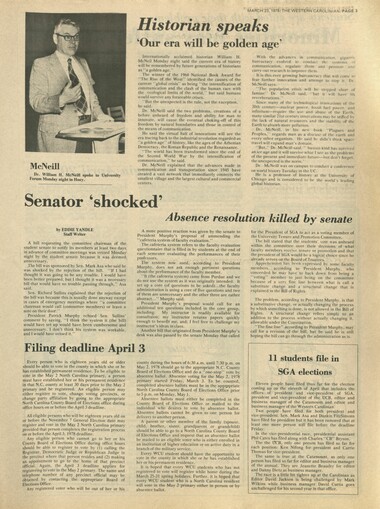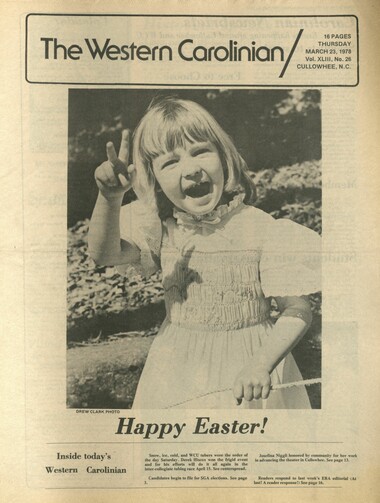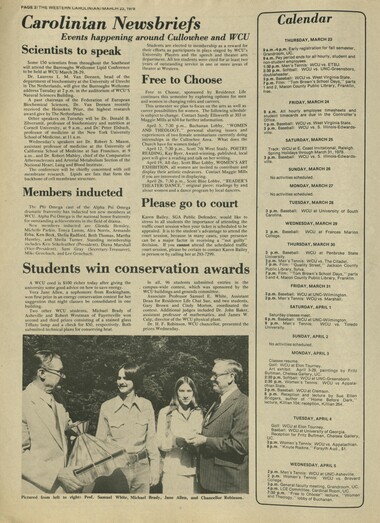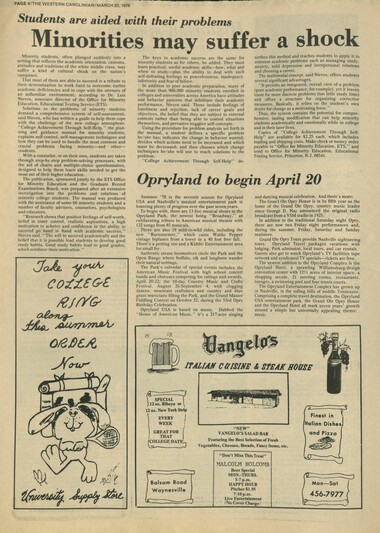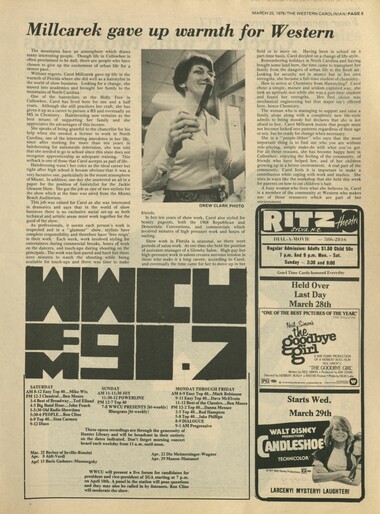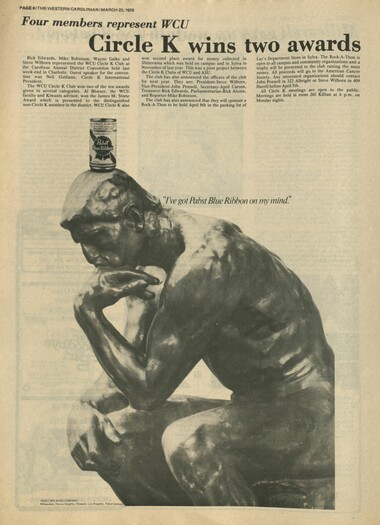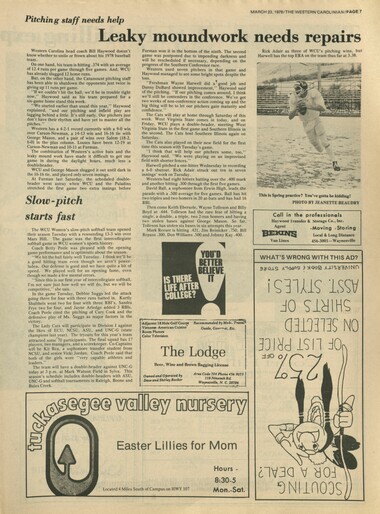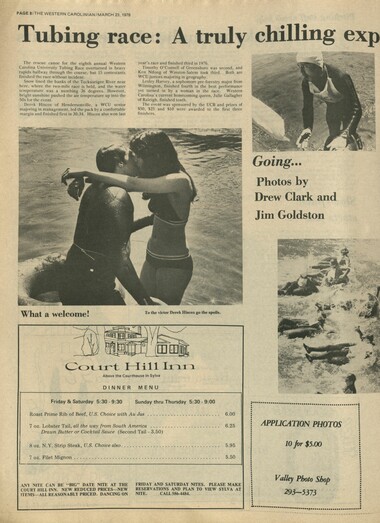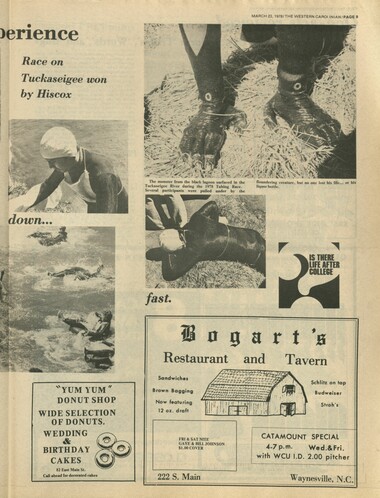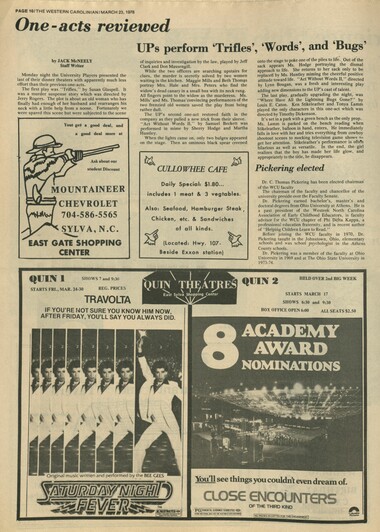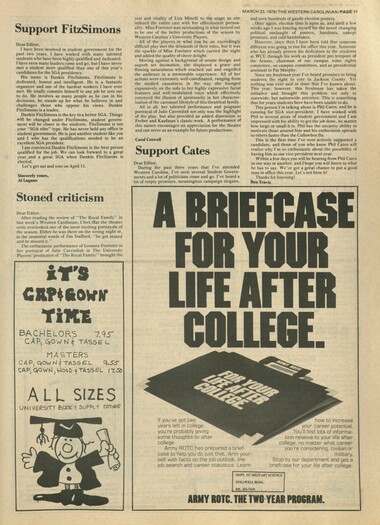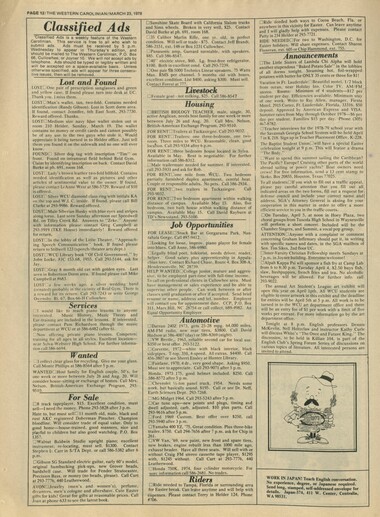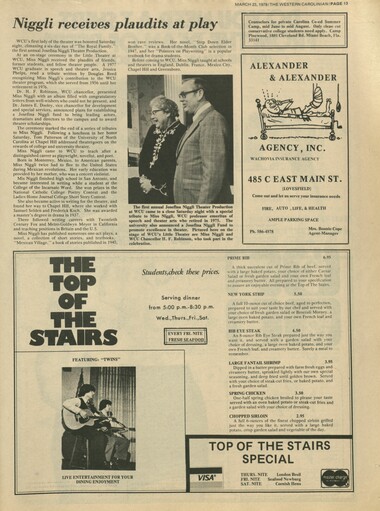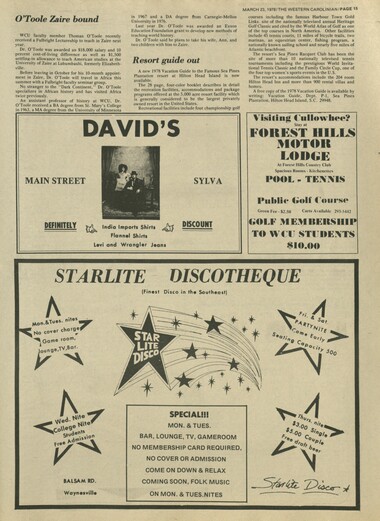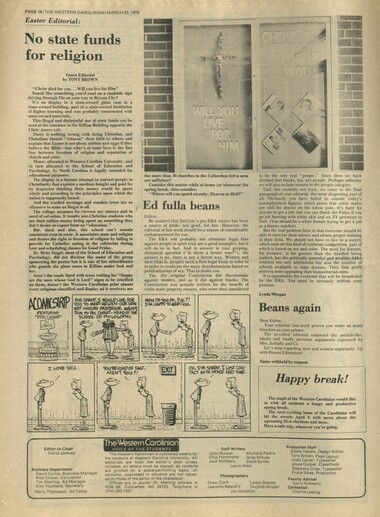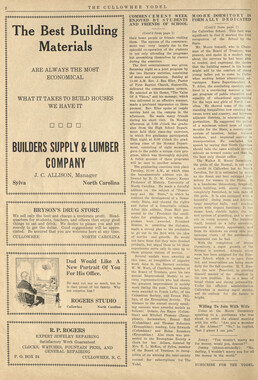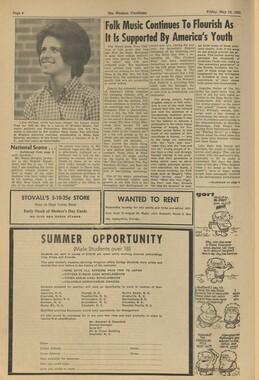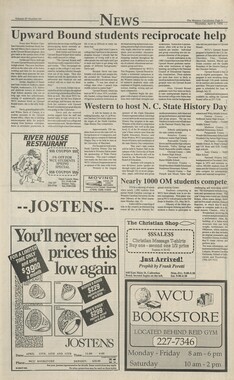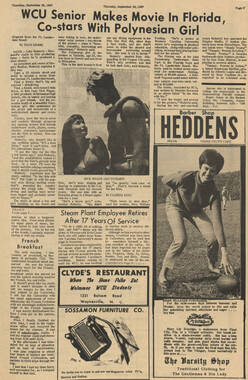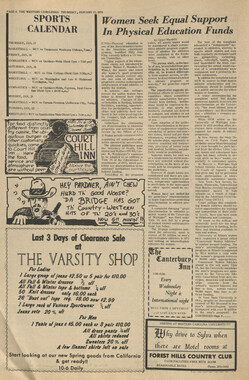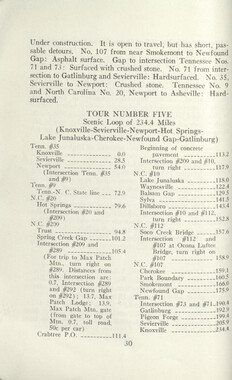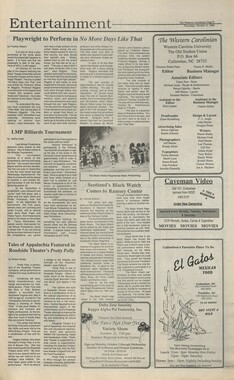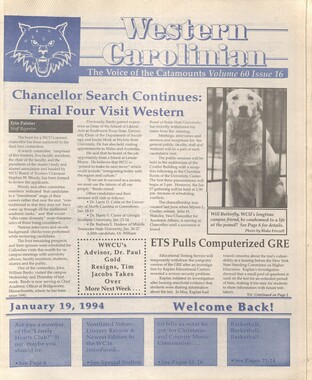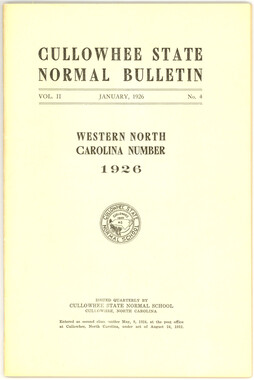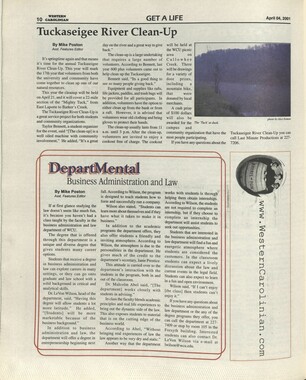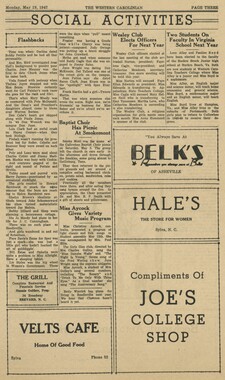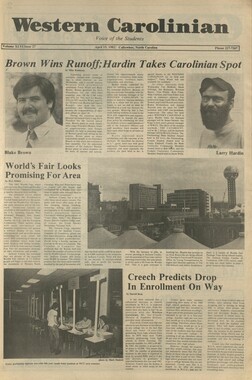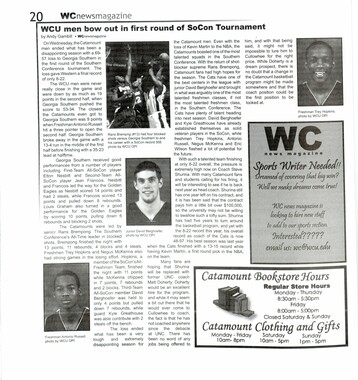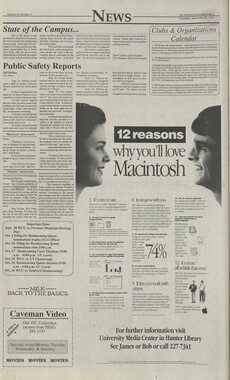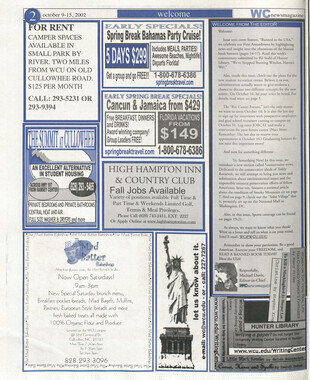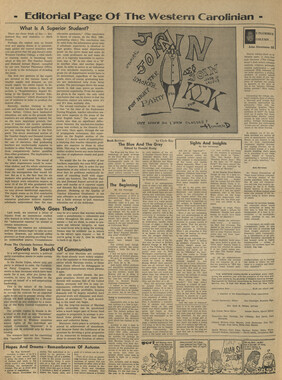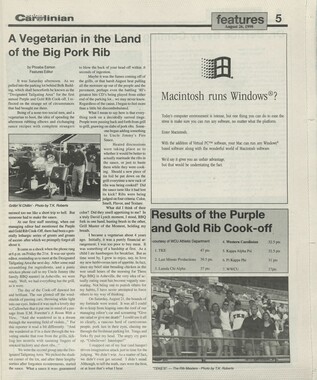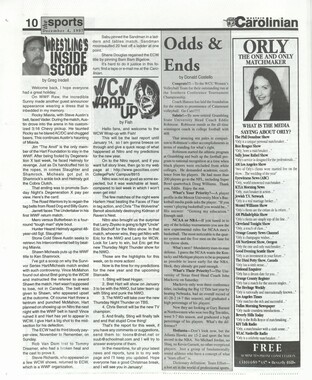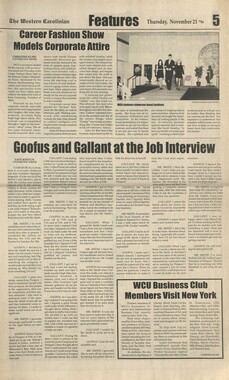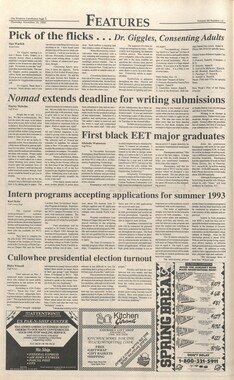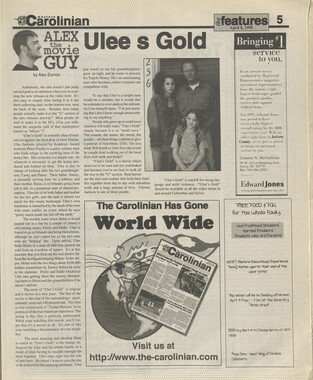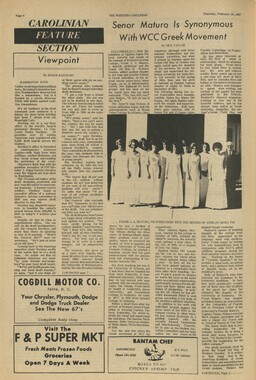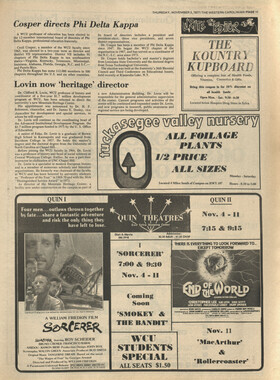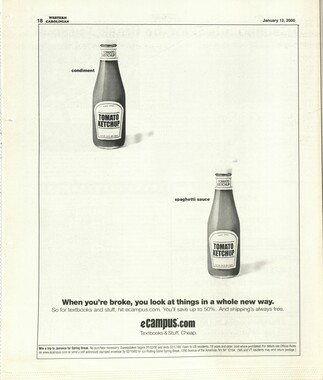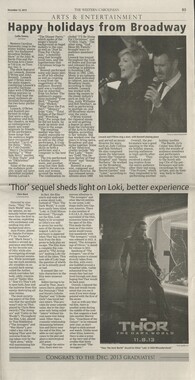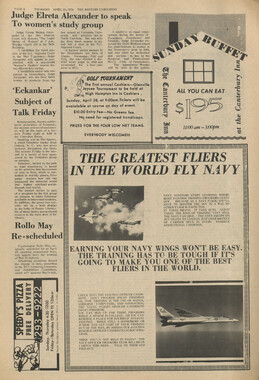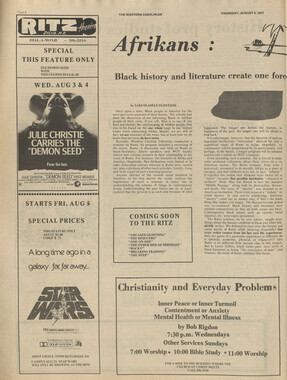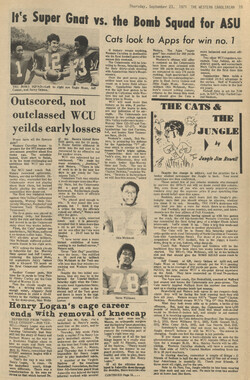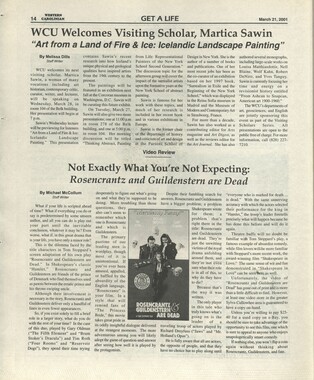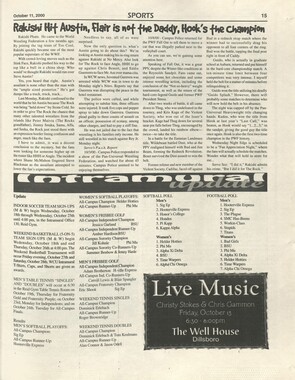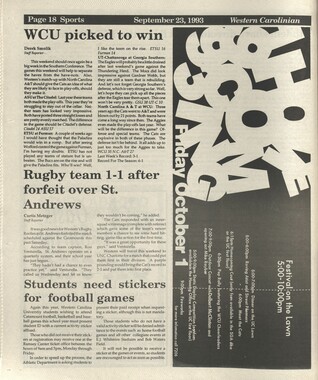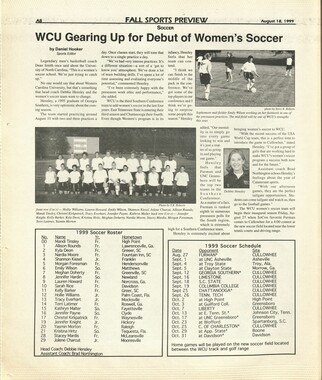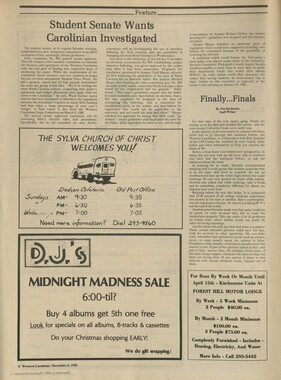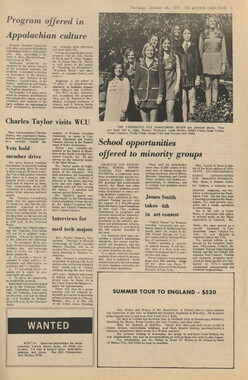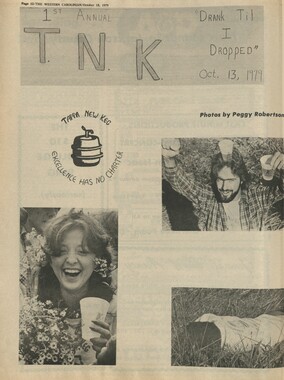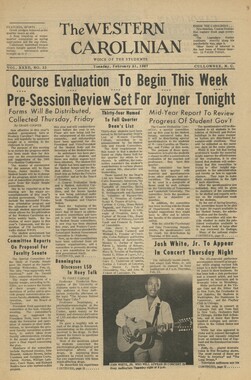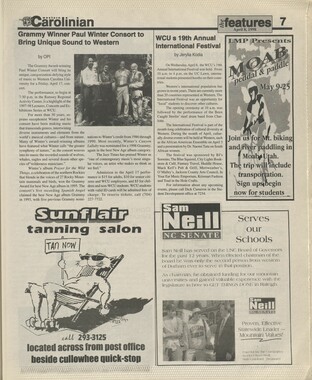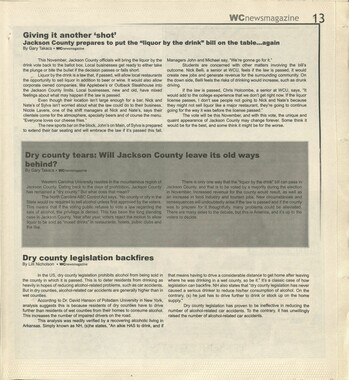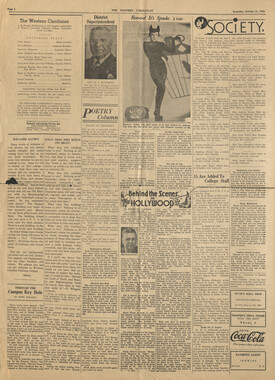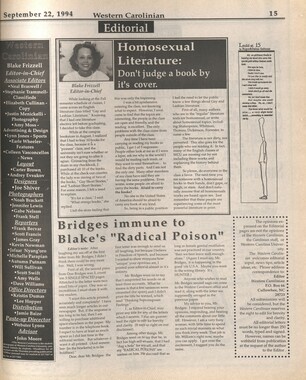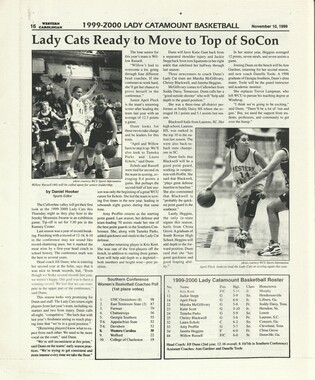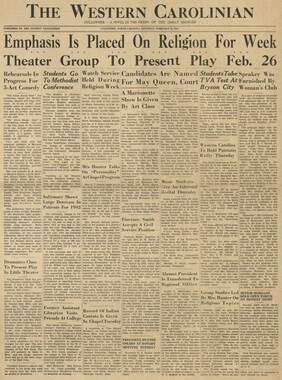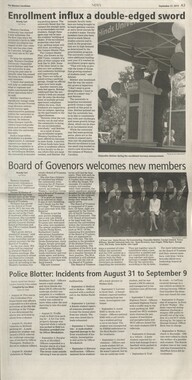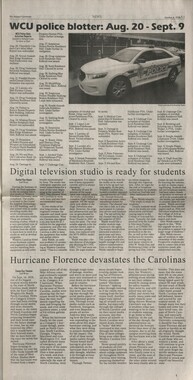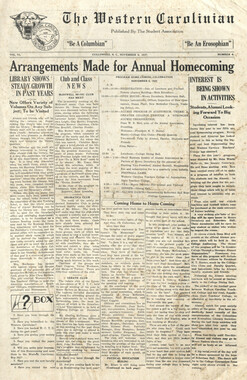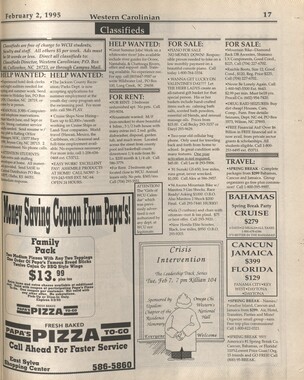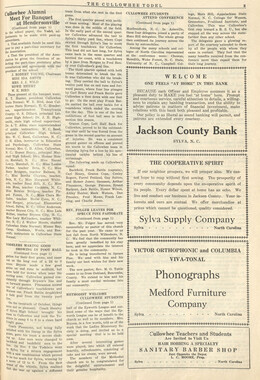Western Carolina University (21)
View all
- Canton Champion Fibre Company (2308)
- Cherokee Traditions (291)
- Civil War in Southern Appalachia (165)
- Craft Revival (1942)
- George Masa Collection (137)
- Great Smoky Mountains - A Park for America (3080)
- Highlights from Western Carolina University (422)
- Horace Kephart (973)
- Journeys Through Jackson (159)
- LGBTQIA+ Archive of Jackson County (89)
- Oral Histories of Western North Carolina (318)
- Picturing Appalachia (6617)
- Stories of Mountain Folk (413)
- Travel Western North Carolina (153)
- Western Carolina University Fine Art Museum Vitreograph Collection (129)
- Western Carolina University Herbarium (92)
- Western Carolina University: Making Memories (738)
- Western Carolina University Publications (2491)
- Western Carolina University Restricted Electronic Theses and Dissertations (146)
- Western North Carolina Regional Maps (71)
- World War II in Southern Appalachia (131)
University of North Carolina Asheville (6)
View all
- Allanstand Cottage Industries (62)
- Appalachian National Park Association (53)
- Bennett, Kelly, 1890-1974 (1463)
- Berry, Walter (76)
- Brasstown Carvers (40)
- Carver, George Washington, 1864?-1943 (26)
- Cathey, Joseph, 1803-1874 (1)
- Champion Fibre Company (233)
- Champion Paper and Fibre Company (297)
- Cherokee Indian Fair Association (16)
- Cherokee Language Program (22)
- Crowe, Amanda (40)
- Edmonston, Thomas Benton, 1842-1907 (7)
- Ensley, A. L. (Abraham Lincoln), 1865-1948 (275)
- Fromer, Irving Rhodes, 1913-1994 (70)
- George Butz (BFS 1907) (46)
- Goodrich, Frances Louisa (120)
- Grant, George Alexander, 1891-1964 (96)
- Heard, Marian Gladys (60)
- Kephart, Calvin, 1883-1969 (15)
- Kephart, Horace, 1862-1931 (313)
- Kephart, Laura, 1862-1954 (67)
- Laney, Gideon Thomas, 1889-1976 (439)
- Masa, George, 1881-1933 (61)
- McElhinney, William Julian, 1896-1953 (44)
- Niggli, Josephina, 1910-1983 (10)
- North Carolina Park Commission (105)
- Osborne, Kezia Stradley (9)
- Owens, Samuel Robert, 1918-1995 (11)
- Penland Weavers and Potters (36)
- Roberts, Vivienne (15)
- Roth, Albert, 1890-1974 (142)
- Schenck, Carl Alwin, 1868-1955 (1)
- Sherrill's Photography Studio (2565)
- Southern Highland Handicraft Guild (127)
- Southern Highlanders, Inc. (71)
- Stalcup, Jesse Bryson (46)
- Stearns, I. K. (213)
- Thompson, James Edward, 1880-1976 (226)
- United States. Indian Arts and Crafts Board (130)
- USFS (683)
- Vance, Zebulon Baird, 1830-1894 (1)
- Weaver, Zebulon, 1872-1948 (58)
- Western Carolina College (230)
- Western Carolina Teachers College (282)
- Western Carolina University (2008)
- Western Carolina University. Mountain Heritage Center (18)
- Whitman, Walt, 1819-1892 (10)
- Wilburn, Hiram Coleman, 1880-1967 (73)
- Williams, Isadora (3)
- Cain, Doreyl Ammons (0)
- Crittenden, Lorraine (0)
- Rhodes, Judy (0)
- Smith, Edward Clark (0)
- Appalachian Region, Southern (3032)
- Asheville (N.C.) (1945)
- Avery County (N.C.) (26)
- Blount County (Tenn.) (195)
- Buncombe County (N.C.) (1680)
- Cherokee County (N.C.) (283)
- Clay County (N.C.) (556)
- Graham County (N.C.) (238)
- Great Smoky Mountains National Park (N.C. and Tenn.) (525)
- Haywood County (N.C.) (3573)
- Henderson County (N.C.) (70)
- Jackson County (N.C.) (4925)
- Knox County (Tenn.) (35)
- Knoxville (Tenn.) (13)
- Lake Santeetlah (N.C.) (10)
- Macon County (N.C.) (421)
- Madison County (N.C.) (216)
- McDowell County (N.C.) (39)
- Mitchell County (N.C.) (135)
- Polk County (N.C.) (35)
- Qualla Boundary (982)
- Rutherford County (N.C.) (78)
- Swain County (N.C.) (2185)
- Transylvania County (N.C.) (270)
- Watauga County (N.C.) (12)
- Waynesville (N.C.) (86)
- Yancey County (N.C.) (72)
- Aerial Photographs (3)
- Aerial Views (60)
- Albums (books) (4)
- Articles (1)
- Artifacts (object Genre) (228)
- Bibliographies (1)
- Biography (general Genre) (2)
- Cards (information Artifacts) (38)
- Clippings (information Artifacts) (192)
- Copybooks (instructional Materials) (3)
- Crafts (art Genres) (622)
- Depictions (visual Works) (21)
- Design Drawings (1)
- Digital Moving Image Formats (2)
- Drawings (visual Works) (185)
- Envelopes (101)
- Exhibitions (events) (1)
- Facsimiles (reproductions) (1)
- Fiction (general Genre) (4)
- Financial Records (12)
- Fliers (printed Matter) (67)
- Glass Plate Negatives (381)
- Guidebooks (2)
- Internegatives (10)
- Interviews (823)
- Land Surveys (102)
- Letters (correspondence) (1045)
- Manuscripts (documents) (618)
- Maps (documents) (177)
- Memorandums (25)
- Minutes (administrative Records) (59)
- Negatives (photographs) (6090)
- Newsletters (1290)
- Newspapers (2)
- Notebooks (8)
- Occupation Currency (1)
- Paintings (visual Works) (1)
- Pen And Ink Drawings (1)
- Periodicals (194)
- Personal Narratives (10)
- Photographs (12977)
- Plans (maps) (1)
- Poetry (6)
- Portraits (4568)
- Postcards (329)
- Programs (documents) (181)
- Publications (documents) (2444)
- Questionnaires (65)
- Relief Prints (26)
- Sayings (literary Genre) (1)
- Scrapbooks (282)
- Sheet Music (2)
- Slides (photographs) (402)
- Songs (musical Compositions) (2)
- Sound Recordings (802)
- Specimens (92)
- Speeches (documents) (18)
- Tintypes (photographs) (8)
- Transcripts (329)
- Text Messages (0)
- A.L. Ensley Collection (275)
- Appalachian Industrial School Records (7)
- Appalachian National Park Association Records (336)
- Axley-Meroney Collection (2)
- Bayard Wootten Photograph Collection (20)
- Bethel Rural Community Organization Collection (7)
- Blumer Collection (5)
- C.W. Slagle Collection (20)
- Canton Area Historical Museum (2110)
- Carlos C. Campbell Collection (462)
- Cataloochee History Project (64)
- Cherokee Studies Collection (4)
- Daisy Dame Photograph Album (5)
- Daniel Boone VI Collection (1)
- Doris Ulmann Photograph Collection (112)
- Elizabeth H. Lasley Collection (1)
- Elizabeth Woolworth Szold Fleharty Collection (4)
- Frank Fry Collection (95)
- George Masa Collection (173)
- Gideon Laney Collection (452)
- Hazel Scarborough Collection (2)
- Hiram C. Wilburn Papers (28)
- Historic Photographs Collection (236)
- Horace Kephart Collection (861)
- Humbard Collection (33)
- Hunter and Weaver Families Collection (1)
- I. D. Blumenthal Collection (4)
- Isadora Williams Collection (4)
- Jesse Bryson Stalcup Collection (47)
- Jim Thompson Collection (224)
- John B. Battle Collection (7)
- John C. Campbell Folk School Records (80)
- John Parris Collection (6)
- Judaculla Rock project (2)
- Kelly Bennett Collection (1482)
- Love Family Papers (11)
- Major Wiley Parris Civil War Letters (3)
- Map Collection (12)
- McFee-Misemer Civil War Letters (34)
- Mountain Heritage Center Collection (4)
- Norburn - Robertson - Thomson Families Collection (44)
- Pauline Hood Collection (7)
- Pre-Guild Collection (2)
- Qualla Arts and Crafts Mutual Collection (12)
- R.A. Romanes Collection (681)
- Rosser H. Taylor Collection (1)
- Samuel Robert Owens Collection (94)
- Sara Madison Collection (144)
- Sherrill Studio Photo Collection (2558)
- Smoky Mountains Hiking Club Collection (616)
- Stories of Mountain Folk - Radio Programs (374)
- The Reporter, Western Carolina University (510)
- Venoy and Elizabeth Reed Collection (16)
- WCU Gender and Sexuality Oral History Project (36)
- WCU Mountain Heritage Center Oral Histories (25)
- WCU Oral History Collection - Mountain People, Mountain Lives (71)
- WCU Students Newspapers Collection (1923)
- Western North Carolina Tomorrow Black Oral History Project (69)
- William Williams Stringfield Collection (2)
- Zebulon Weaver Collection (109)
- African Americans (390)
- Appalachian Trail (35)
- Artisans (521)
- Cherokee art (84)
- Cherokee artists -- North Carolina (10)
- Cherokee language (21)
- Cherokee pottery (101)
- Cherokee women (208)
- Church buildings (190)
- Civilian Conservation Corps (U.S.) (111)
- College student newspapers and periodicals (2012)
- Dams (108)
- Dance (1023)
- Education (222)
- Floods (63)
- Folk music (1015)
- Forced removal, 1813-1903 (2)
- Forest conservation (220)
- Forests and forestry (1198)
- Gender nonconformity (4)
- Great Smoky Mountains National Park (N.C. and Tenn.) (181)
- Hunting (47)
- Landscape photography (25)
- Logging (122)
- Maps (83)
- Mines and mineral resources (9)
- North Carolina -- Maps (18)
- Paper industry (38)
- Postcards (255)
- Pottery (135)
- Railroad trains (72)
- Rural electrification -- North Carolina, Western (3)
- School integration -- Southern States (2)
- Segregation -- North Carolina, Western (5)
- Slavery (5)
- Sports (452)
- Storytelling (243)
- Waterfalls -- Great Smoky Mountains (N.C. and Tenn.) (66)
- Weaving -- Appalachian Region, Southern (280)
- Wood-carving -- Appalachian Region, Southern (328)
- World War, 1939-1945 (173)
Western Carolinian Volume 43 Number 26
Item
Item’s are ‘child’ level descriptions to ‘parent’ objects, (e.g. one page of a whole book).
-
-
MARCH 23, 1978" /THE WESTERN CAROLINIAN PAGE 3 McNeill Historian speaks 4Our era will be golden age' Dr. William H. McNeill spoke to University Forum Monday night in Hoey. International!) acclaimed historian William H. McNeil Mondav night said the current era ot historv will be remembered bv future generations of historians as "a golden age." rhe winner of the D'M National Book Award for "The Rise of the West" identified the causes ol the current "global crisis'' as being "the intensification of communication and the clash of the human race with Ihe ecological limits of tin- world," but said humans would survive anv forseeahle crises. "But the unexpected is the rule, not the exception, he said. Dr. McNeill said the two problems, creations ol a before unheard of freedom and abililv lor man to innovate, will cause the eventual choking-off of this freedom bv natural boundaries ami those in control of tin- means of communication. Mr said Ihe virtual halt of innovations will see the era tracing hack to the industrial revolution regarded as "a golden age" of history, like the ages of tin- Athenian Democracy, the Roman Republic and tin- Renaissance. "The world has been transformed since thi' end of the Second World War by the intensification of communication." he said. Dr. McNeill explained that the advances made in communication and transportation since 1945 have created a vast network that immediately connects the smallest village and the largest cultural and commercial centers. With the advances in communication, bureacracv evolved to conduct the systems communication, regulate them and promon carry-out research to improve them It is this ever growing bun aucraiv that will ior h .ii further innovation and attempt to nop it, in McNeill savs. "the population crisis will he stopped short ,>t famine" Dr. McNeill said, hut u will have its reverberations." Suue many ot the technological innovations ot the 20th Century- nuclear power, lossil fuel power and infinitum* require the use and abuse <>t the Earth, man) similar 21st century innovations mav he stdli i! bj ihe lad of natural resources and the inability .>( the Earth to absorb more pollution. Dr. McNeill, in Ins new book "Plagues and Peoples,"' regards man as a disease ol the earth and every other organism. He said hi didn't think spaci travel a ill expand man's domain. "Bui." Dr. McNeill said, " hum.in kind has survived an ice age and it w ill survive w hat I see as the problems of the present and immediate future—but don't forget, the unexpected is the norm.' Dr. McNeill was on campus to conduct a conference on world historv I uesdav in the VC. He is a professor ol fusion at the University of Chicago anil is considered lo l«' the world's leading global historian. Senator 'shocked' Absence resolution killed by senate by EDDIE YANDLE Staff Writer A bill requesting the committee chairman of the student senate to notify its members at least two days in advance of committee meetings was vetoed Monday night by the student senate because it was deemed unnecessary. The hill was sponsored by Sen. Mark Asa who said he was shocked by the rejection of the bill. "If I had thought it was going to be any trouble, I would have been better prepared, but I thought it was a necessary bill that would have no trouble passing through," Asa said. Sen. Richard Sullins explained that the rejection of the bill was because this is usually done anyway except in cases of emergency meetings where "a committee chairman would call (committee members) or leave a note on their door." President Patrick Murphy echoed Sen. Sullins' comment by saying, "I think the system it (the bill) would have set up would have been cumbersome and unnecessary. I don't think his system was workable, and I would have vetoed it." A more positive reaction was given by the senate to President Murphy's proposal of ammending the "cafeteria system of faculty evaluation." The cafeteria system refers to the faculty evaluation questionnaire that is filled in bv students at the end of each semester evaluating the performances of their professors. Ihe svsteni now used, according to President Murphy, does not ask enough pertinent questions about the performance of the faculty member. "It (the cafeteria system) came from Purdue and we do not use the svsteni as it was originally intended. It set up a core (of questions to be asked)...the faculty administration is using a core of five questions and two of them are unnecessary and the other three are rather abstract..." Murphy said. President Murphy's proposal would call for an additional ten questions included in the core group, including: My instructor is readily available for consultaion; my instructor returns papers quickly enough to benefit me, and: I feel free to challenge my instructor's ideas in class. Another bill that originated from President Murphy's desk was also passed by the senate Monday that called Filing deadline April 3 Every person who is eighteen years old or older should be able to vote in the county in which she or he has established permanent residence. To be eligible to vote in the May 2 North Carolina primary, a person must have established her or his permanent residence in that N.C. county at least 30 days prior to the May 2 primary and be registered. An eligible person may either register to vote, change voting precincts, or change party affiliation by going to the appropriate North Carolina County Board of Elections office during office hours on or before the April 3 deadline. All eligible persons who will be eighteen years old on or before the November 7 General Election date may register and vote in the May 2 North Carolina primary provided that person completes the registration process on or before the April 3. 1978 deadline. Anv eligible person who cannot go to her or his Countv Board of Elections Office during office hours should be able to register to vote by (1) calling the Registrar. Democratic Judge or Republican Judge in the precinct where that person resides and (2) making an appointment to go to the home of that precinct official. Again, the April 3 deadline applies for registering to vote in the May 2 primary. The name and telephone number of any precinct official may be obtained by contacting the appropriate Board of Elections Office. Anv registered voter who will be out of her or his county during the hours of 6:30 a.m. until 7:30 p.m. on May 2, 1978 should go to the appropriate N.C. County- Board of Elections Office and do a "one-stop" vote by absentee ballot. Absentee voting for the May 2. 1978 primary started Friday, March 3. To be counted, completed absentee ballots must be in the apprppriate North Carolina County Board of Elections Office prior to5 p.m. on Monday, May 1. Absentee ballots must either be completed in the County Board of Elections Office or mailed to the individual who desires to vote by absentee ballot. Absentee ballots cannot be given to one person for delivery to another person. A parent or other member of the family (spouse, child, brother, sister, grandparent or grandchild) should be able to go to a North Carolina County Board of Elections Office and request that an absentee ballot be mailed to an eligible voter who is either enrolled in an institution of higher education or on active duty in a branch of the military service. Every WCU student should have the opportunity to vote in the county in which she or he has established her or his permanent residence. It is hoped that every WCU students who has not registered to vote will register while home during the March 25-31 spring holidays. Further, it is hoped that every WCU student who is a North Carolina resident will vote in the May 2 primary either in person or by absentee ballot. for the President of SCA to act .is a voting member of ihe University Tenure and Promotion Committee. Ihe bill slated that the Students' vole was unheard within the committee over their decisions of what faculty members receive tenure or promotion and Ih.it the president of SGA would be a logical choice since he a I read v serves on tin Hoard of Trustees. Apprehension has been expressed In some faculty members, according lo President Murphy, who com coded he mav have to back down from being a "voting" member to just being on the committee because of a very fine line between what is call a substitute change and a structural change that is explained in the Bill of Rights. The problem, according to President Murphy, is that a substitutive change, or actually changing the process by which something is done, is not allowed in the Bill of Rights. A structural change refers simply to an addition to the process without actually changing it. allowable under the Constitution, "The fine line" according to President Murphy, may call for a revision of the bill, but he said lie is still hoping the bill can go through the administration as is. 11 students file in SGA elections Eleven people have filed thus far for the election coming up on the eleveth of April that includes the offices of president and vice-president of SGA. president and vice-president of the UCB. editor and business manager of the Catamount and editor and business manager of the Western Carolinian. Two people have filed for both president and vice-president. Sen. Mark Asa and Dunkin FitzSimons have filed for president but it has been rumored that at least one more person will file before the deadline Friday. In the vice-presidential race, presidential assistant Phil Cates has filed along with Charles "CB" Bryson. The the UCB, only one person has filed so far for each position: Ken Nifong for president and Carrie Thomas for vice-president. The same is true at the Catamount, as only one person has filed so far for editor and business manager of the annual. They are Jeanette Beaudry for editor and Danny Dietz as business manager. The race is a little bit tighter up at the Carolinian as Editor David Jackson is being challenged by Mark Wilkins while business manager David Curtis goes unchallenged for his second year in that office.
Object
Object’s are ‘parent’ level descriptions to ‘children’ items, (e.g. a book with pages).
-
The Western Carolinian is Western Carolina University’s student-run newspaper. The paper was published as the Cullowhee Yodel from 1924 to 1931 before changing its name to The Western Carolinian in 1933.
-
